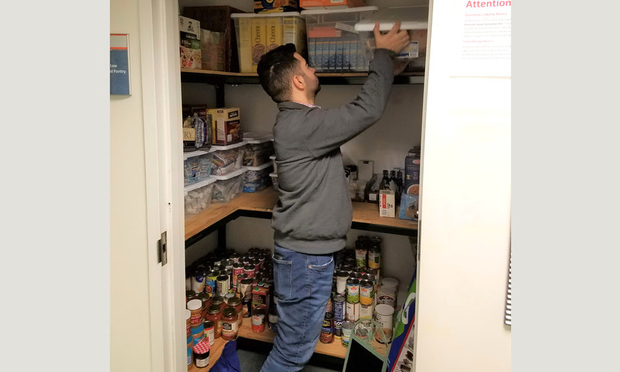Cash-Strapped and Hungry, Law Students Turn to School Food Pantries
A growing number of law schools are helping students get enough to eat, especially important assistance toward the end of the semester when funding from loans often runs out.
January 22, 2020 at 02:07 PM
5 minute read
 William Martinez, a second-year student at Seton Hall University School of Law, works in the school's food pantry. (Courtesy photo.)
William Martinez, a second-year student at Seton Hall University School of Law, works in the school's food pantry. (Courtesy photo.)
It costs thousands each year to attend law school, but some future lawyers are struggling to meet their basic needs—like getting enough to eat.
At least four law schools in the past year have opened up food pantries for students, or will soon do so. They join a growing number of law campuses already helping students put food on the table.
The latest to follow the trend is the University of Minnesota Law School, which this week opened Mondale Kitchen. It's a student-led effort that aims to provide law students not just with non-perishable items—think cans of tuna and ramen packets—but also fresh produce and ready-to-eat meals.
Similarly, three students at the University of Hawaii William S. Richardson School of Law are working to establish a new food pantry for classmates that will stock healthy snacks, breakfast food, and kitchen staples that students can take home.
Meanwhile, the Pennsylvania State University Dickinson Law last fall opened what it dubbed the "Free Pantry and Professional Clothing Closet," where students can get not only non-perishable food and toiletries, but also gently used workplace attire at no cost. Seton Hall University School of Law opened a food pantry in February with donor funding.
For Minnesota law students, food insecurity is a result not just of finances but also access to meals, said third-year Emily Franco, who is spearheading the Mondale Kitchen initiative. Many students are studying on campus until 9 p.m., when there are few restaurants or grocery stores open nearby. They are often left scrounging for leftovers from lunch events or journal offices, she said.
"It's really hard to expect students to be performing well academically and getting out there and doing well professionally and socially when they aren't able to eat," Franco said. "We're hearing a lot that finances are an issue, just as much as time is. Students will take out loans, but they might run out of money midway through the semester. It's hard to find additional ways to make income to find food, especially for first-year students, so we want to make it one less thing for them to worry about."
Campus food insecurity is a major issue. A 2019 survey of students at 100 colleges and universities by Temple University found that 45% had been "food insecure" within the past 30 days. Many universities have campus-wide food pantries for all students, but those are sometime located across campus—or even on another campus entirely—from law schools and may have limited hours. Bringing the food pantries into law schools makes it much more accessible to time-strapped law students, organizers say.
The City University of New York School of Law was the first law school to establish its own food pantry, in 2014, according to Amanda Beltran, the director of student activities and interim director of student affairs. She started the food pantry soon after her arrival at CUNY, after she noticed students coming into the office seeking emergency financial assistance so they could buy groceries. Now in its sixth year, the pantry is expanding from stocking non-perishable items to add fresh and frozen foods.
"As law schools focus more on serving non-traditional students, they need to reassess and look at the fact that student loans don't cover everything—especially in New York City where the cost of living in very high," Beltran said.
Franco said administrators from CUNY were instrumental in helping her work through the logistics of Minnesota's food pantry and getting an idea of how much money would be needed to get it off the ground.
Student organizers at Minnesota have raised nearly $5,000 for Mondale Kitchen from students, faculty and staff, with some additional funding coming from the law school through its Law Council. At Hawaii Law, funding for its new food pantry is coming from donations and a small semester allocation from the Student Bar Association, but eventually organizers hope to secure monthly sponsorships from law firms, according to a story in the Honolulu Civil Beat.
It's not just CUNY Law that has been an early adopter of the food pantry trend. Among the law schools that already have their own food pantries are the University of Illinois at Chicago John Marshall Law School, which also has a free professional clothing closet; Stetson University College of Law; and the University of Arkansas at Little Rock William H. Bowen School of Law.
"There's sort of this image of the person who doesn't have access to food as someone who is down on their luck," Franco said. "But this is something that a lot of members of our community face, and having these conversation out in the open kind of reduces the stigma around it. Hopefully it opens more doors to be able to help people in this positions, and we also want to reduce the shame around asking for help."
This content has been archived. It is available through our partners, LexisNexis® and Bloomberg Law.
To view this content, please continue to their sites.
Not a Lexis Subscriber?
Subscribe Now
Not a Bloomberg Law Subscriber?
Subscribe Now
NOT FOR REPRINT
© 2025 ALM Global, LLC, All Rights Reserved. Request academic re-use from www.copyright.com. All other uses, submit a request to [email protected]. For more information visit Asset & Logo Licensing.
You Might Like
View All
Librarian's Termination Violated First Amendment Protections, Lawsuit Claims
3 minute read
After Shutting USAID, Trump Eyes Department of Education, CFPB

Divided State Supreme Court Clears the Way for Child Sexual Abuse Cases Against Church, Schools

Longtime Purdue GC Accused of Drunken Driving Hires Big-Name Defense Attorney
3 minute readTrending Stories
- 1January Petitions Press High Court on Guns, Birth Certificate Sex Classifications
- 2'A Waste of Your Time': Practice Tips From Judges in the Oakland Federal Courthouse
- 3Judge Extends Tom Girardi's Time in Prison Medical Facility to Feb. 20
- 4Supreme Court Denies Trump's Request to Pause Pending Environmental Cases
- 5‘Blitzkrieg of Lawlessness’: Environmental Lawyers Decry EPA Spending Freeze
Who Got The Work
J. Brugh Lower of Gibbons has entered an appearance for industrial equipment supplier Devco Corporation in a pending trademark infringement lawsuit. The suit, accusing the defendant of selling knock-off Graco products, was filed Dec. 18 in New Jersey District Court by Rivkin Radler on behalf of Graco Inc. and Graco Minnesota. The case, assigned to U.S. District Judge Zahid N. Quraishi, is 3:24-cv-11294, Graco Inc. et al v. Devco Corporation.
Who Got The Work
Rebecca Maller-Stein and Kent A. Yalowitz of Arnold & Porter Kaye Scholer have entered their appearances for Hanaco Venture Capital and its executives, Lior Prosor and David Frankel, in a pending securities lawsuit. The action, filed on Dec. 24 in New York Southern District Court by Zell, Aron & Co. on behalf of Goldeneye Advisors, accuses the defendants of negligently and fraudulently managing the plaintiff's $1 million investment. The case, assigned to U.S. District Judge Vernon S. Broderick, is 1:24-cv-09918, Goldeneye Advisors, LLC v. Hanaco Venture Capital, Ltd. et al.
Who Got The Work
Attorneys from A&O Shearman has stepped in as defense counsel for Toronto-Dominion Bank and other defendants in a pending securities class action. The suit, filed Dec. 11 in New York Southern District Court by Bleichmar Fonti & Auld, accuses the defendants of concealing the bank's 'pervasive' deficiencies in regards to its compliance with the Bank Secrecy Act and the quality of its anti-money laundering controls. The case, assigned to U.S. District Judge Arun Subramanian, is 1:24-cv-09445, Gonzalez v. The Toronto-Dominion Bank et al.
Who Got The Work
Crown Castle International, a Pennsylvania company providing shared communications infrastructure, has turned to Luke D. Wolf of Gordon Rees Scully Mansukhani to fend off a pending breach-of-contract lawsuit. The court action, filed Nov. 25 in Michigan Eastern District Court by Hooper Hathaway PC on behalf of The Town Residences LLC, accuses Crown Castle of failing to transfer approximately $30,000 in utility payments from T-Mobile in breach of a roof-top lease and assignment agreement. The case, assigned to U.S. District Judge Susan K. Declercq, is 2:24-cv-13131, The Town Residences LLC v. T-Mobile US, Inc. et al.
Who Got The Work
Wilfred P. Coronato and Daniel M. Schwartz of McCarter & English have stepped in as defense counsel to Electrolux Home Products Inc. in a pending product liability lawsuit. The court action, filed Nov. 26 in New York Eastern District Court by Poulos Lopiccolo PC and Nagel Rice LLP on behalf of David Stern, alleges that the defendant's refrigerators’ drawers and shelving repeatedly break and fall apart within months after purchase. The case, assigned to U.S. District Judge Joan M. Azrack, is 2:24-cv-08204, Stern v. Electrolux Home Products, Inc.
Featured Firms
Law Offices of Gary Martin Hays & Associates, P.C.
(470) 294-1674
Law Offices of Mark E. Salomone
(857) 444-6468
Smith & Hassler
(713) 739-1250








